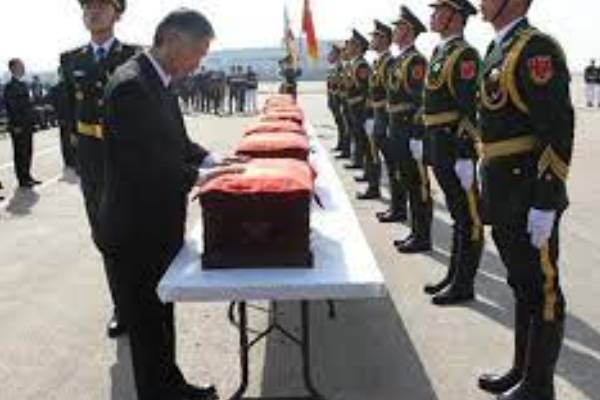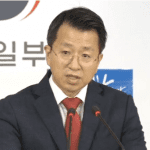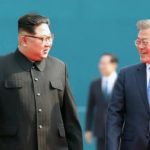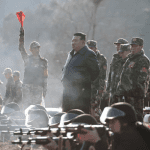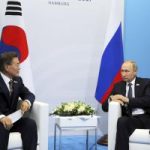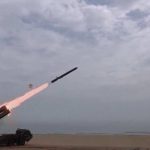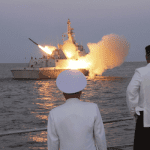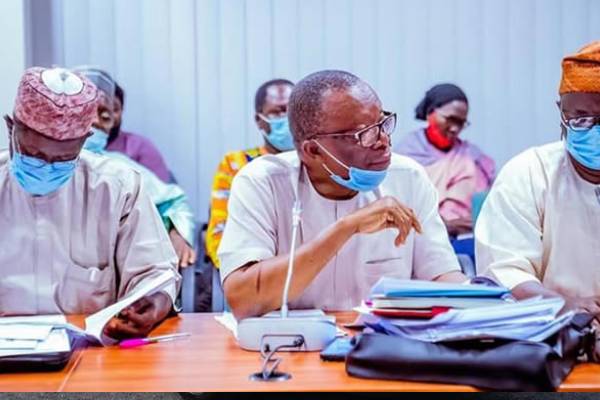South Korea has repatriated the remains of 88 Chinese soldiers killed during the Korean War, the first such ceremony since South Korea’s President Yoon Suk-yeol took office in May.
Wooden caskets containing the remains of the Chinese soldiers were handed over to a Chinese military honour guard during a solemn ceremony at Incheon International Airport near Seoul on Friday.
China’s ambassador to South Korea Xing Haiming covered each of the caskets with the Chinese national flag before they were loaded onto a Chinese air force transport plane, a live video of the event showed.
“Our yearly handovers of the remains of Chinese troops are held on a humanitarian basis, but also symbolise friendly cooperation between South Korea and China,” Lee Do-hoon, South Korea’s second vice foreign minister, said at the event.
China intervened on North Korea’s side during the 1950-53 Korean War.
An estimated three million Communist Chinese troops fought alongside Pyongyang’s forces and helped tip the balance of the conflict for the North.
Beijing’s intervention saved North Korea from defeat and pushed United States-led United Nations forces back across the 38th parallel, before the war ended in an impasse that persists to this day.
Casualty figures remain disputed but Western estimates commonly cite a figure of 400,000 Chinese deaths, while Chinese sources give a death toll of about 180,000 from the conflict, which is known in China as the War to Resist US Aggression and Aid Korea.
The caskets containing the remains were received hours later on Friday in China’s northeastern city of Shenyang in a military ceremony attended by Chinese veterans of the three-year conflict in Korea.
Two Chinese air force J-20 fighter jets accompanied the transport plane on its arrival at the airport, and firefighting trucks sprayed water cannon above the aircraft as it taxied to a halt. Ground staff stood to attention, a video of the arrival on State-run media showed.
This was the ninth such handover since South Korea and China – former Cold War-era enemies – signed a 2014 agreement on repatriating the remains of fallen soldiers.
Friday’s ceremony brings the total number of returned Chinese remains to 913.
The repatriations are also the first to take place since the inauguration of South Korea’s President Yoon, who has sought to maintain a friendly relationship with Beijing even as he moves to deepen ties with major security ally Washington.
South Korea has repatriated the remains of 88 Chinese soldiers killed during the Korean War, the first such ceremony since South Korea’s President Yoon Suk-yeol took office in May.
Wooden caskets containing the remains of the Chinese soldiers were handed over to a Chinese military honour guard during a solemn ceremony at Incheon International Airport near Seoul on Friday.
China’s ambassador to South Korea Xing Haiming covered each of the caskets with the Chinese national flag before they were loaded onto a Chinese air force transport plane, a live video of the event showed.
“Our yearly handovers of the remains of Chinese troops are held on a humanitarian basis, but also symbolise friendly cooperation between South Korea and China,” Lee Do-hoon, South Korea’s second vice foreign minister, said at the event.
China intervened on North Korea’s side during the 1950-53 Korean War.
An estimated three million Communist Chinese troops fought alongside Pyongyang’s forces and helped tip the balance of the conflict for the North.
Beijing’s intervention saved North Korea from defeat and pushed United States-led United Nations forces back across the 38th parallel, before the war ended in an impasse that persists to this day.
Casualty figures remain disputed but Western estimates commonly cite a figure of 400,000 Chinese deaths, while Chinese sources give a death toll of about 180,000 from the conflict, which is known in China as the War to Resist US Aggression and Aid Korea.
The caskets containing the remains were received hours later on Friday in China’s northeastern city of Shenyang in a military ceremony attended by Chinese veterans of the three-year conflict in Korea.
Two Chinese air force J-20 fighter jets accompanied the transport plane on its arrival at the airport, and firefighting trucks sprayed water cannon above the aircraft as it taxied to a halt. Ground staff stood to attention, a video of the arrival on State-run media showed.
This was the ninth such handover since South Korea and China – former Cold War-era enemies – signed a 2014 agreement on repatriating the remains of fallen soldiers.
Friday’s ceremony brings the total number of returned Chinese remains to 913.
The repatriations are also the first to take place since the inauguration of South Korea’s President Yoon, who has sought to maintain a friendly relationship with Beijing even as he moves to deepen ties with major security ally Washington.
South Korea has repatriated the remains of 88 Chinese soldiers killed during the Korean War, the first such ceremony since South Korea’s President Yoon Suk-yeol took office in May.
Wooden caskets containing the remains of the Chinese soldiers were handed over to a Chinese military honour guard during a solemn ceremony at Incheon International Airport near Seoul on Friday.
China’s ambassador to South Korea Xing Haiming covered each of the caskets with the Chinese national flag before they were loaded onto a Chinese air force transport plane, a live video of the event showed.
“Our yearly handovers of the remains of Chinese troops are held on a humanitarian basis, but also symbolise friendly cooperation between South Korea and China,” Lee Do-hoon, South Korea’s second vice foreign minister, said at the event.
China intervened on North Korea’s side during the 1950-53 Korean War.
An estimated three million Communist Chinese troops fought alongside Pyongyang’s forces and helped tip the balance of the conflict for the North.
Beijing’s intervention saved North Korea from defeat and pushed United States-led United Nations forces back across the 38th parallel, before the war ended in an impasse that persists to this day.
Casualty figures remain disputed but Western estimates commonly cite a figure of 400,000 Chinese deaths, while Chinese sources give a death toll of about 180,000 from the conflict, which is known in China as the War to Resist US Aggression and Aid Korea.
The caskets containing the remains were received hours later on Friday in China’s northeastern city of Shenyang in a military ceremony attended by Chinese veterans of the three-year conflict in Korea.
Two Chinese air force J-20 fighter jets accompanied the transport plane on its arrival at the airport, and firefighting trucks sprayed water cannon above the aircraft as it taxied to a halt. Ground staff stood to attention, a video of the arrival on State-run media showed.
This was the ninth such handover since South Korea and China – former Cold War-era enemies – signed a 2014 agreement on repatriating the remains of fallen soldiers.
Friday’s ceremony brings the total number of returned Chinese remains to 913.
The repatriations are also the first to take place since the inauguration of South Korea’s President Yoon, who has sought to maintain a friendly relationship with Beijing even as he moves to deepen ties with major security ally Washington.
South Korea has repatriated the remains of 88 Chinese soldiers killed during the Korean War, the first such ceremony since South Korea’s President Yoon Suk-yeol took office in May.
Wooden caskets containing the remains of the Chinese soldiers were handed over to a Chinese military honour guard during a solemn ceremony at Incheon International Airport near Seoul on Friday.
China’s ambassador to South Korea Xing Haiming covered each of the caskets with the Chinese national flag before they were loaded onto a Chinese air force transport plane, a live video of the event showed.
“Our yearly handovers of the remains of Chinese troops are held on a humanitarian basis, but also symbolise friendly cooperation between South Korea and China,” Lee Do-hoon, South Korea’s second vice foreign minister, said at the event.
China intervened on North Korea’s side during the 1950-53 Korean War.
An estimated three million Communist Chinese troops fought alongside Pyongyang’s forces and helped tip the balance of the conflict for the North.
Beijing’s intervention saved North Korea from defeat and pushed United States-led United Nations forces back across the 38th parallel, before the war ended in an impasse that persists to this day.
Casualty figures remain disputed but Western estimates commonly cite a figure of 400,000 Chinese deaths, while Chinese sources give a death toll of about 180,000 from the conflict, which is known in China as the War to Resist US Aggression and Aid Korea.
The caskets containing the remains were received hours later on Friday in China’s northeastern city of Shenyang in a military ceremony attended by Chinese veterans of the three-year conflict in Korea.
Two Chinese air force J-20 fighter jets accompanied the transport plane on its arrival at the airport, and firefighting trucks sprayed water cannon above the aircraft as it taxied to a halt. Ground staff stood to attention, a video of the arrival on State-run media showed.
This was the ninth such handover since South Korea and China – former Cold War-era enemies – signed a 2014 agreement on repatriating the remains of fallen soldiers.
Friday’s ceremony brings the total number of returned Chinese remains to 913.
The repatriations are also the first to take place since the inauguration of South Korea’s President Yoon, who has sought to maintain a friendly relationship with Beijing even as he moves to deepen ties with major security ally Washington.
South Korea has repatriated the remains of 88 Chinese soldiers killed during the Korean War, the first such ceremony since South Korea’s President Yoon Suk-yeol took office in May.
Wooden caskets containing the remains of the Chinese soldiers were handed over to a Chinese military honour guard during a solemn ceremony at Incheon International Airport near Seoul on Friday.
China’s ambassador to South Korea Xing Haiming covered each of the caskets with the Chinese national flag before they were loaded onto a Chinese air force transport plane, a live video of the event showed.
“Our yearly handovers of the remains of Chinese troops are held on a humanitarian basis, but also symbolise friendly cooperation between South Korea and China,” Lee Do-hoon, South Korea’s second vice foreign minister, said at the event.
China intervened on North Korea’s side during the 1950-53 Korean War.
An estimated three million Communist Chinese troops fought alongside Pyongyang’s forces and helped tip the balance of the conflict for the North.
Beijing’s intervention saved North Korea from defeat and pushed United States-led United Nations forces back across the 38th parallel, before the war ended in an impasse that persists to this day.
Casualty figures remain disputed but Western estimates commonly cite a figure of 400,000 Chinese deaths, while Chinese sources give a death toll of about 180,000 from the conflict, which is known in China as the War to Resist US Aggression and Aid Korea.
The caskets containing the remains were received hours later on Friday in China’s northeastern city of Shenyang in a military ceremony attended by Chinese veterans of the three-year conflict in Korea.
Two Chinese air force J-20 fighter jets accompanied the transport plane on its arrival at the airport, and firefighting trucks sprayed water cannon above the aircraft as it taxied to a halt. Ground staff stood to attention, a video of the arrival on State-run media showed.
This was the ninth such handover since South Korea and China – former Cold War-era enemies – signed a 2014 agreement on repatriating the remains of fallen soldiers.
Friday’s ceremony brings the total number of returned Chinese remains to 913.
The repatriations are also the first to take place since the inauguration of South Korea’s President Yoon, who has sought to maintain a friendly relationship with Beijing even as he moves to deepen ties with major security ally Washington.
South Korea has repatriated the remains of 88 Chinese soldiers killed during the Korean War, the first such ceremony since South Korea’s President Yoon Suk-yeol took office in May.
Wooden caskets containing the remains of the Chinese soldiers were handed over to a Chinese military honour guard during a solemn ceremony at Incheon International Airport near Seoul on Friday.
China’s ambassador to South Korea Xing Haiming covered each of the caskets with the Chinese national flag before they were loaded onto a Chinese air force transport plane, a live video of the event showed.
“Our yearly handovers of the remains of Chinese troops are held on a humanitarian basis, but also symbolise friendly cooperation between South Korea and China,” Lee Do-hoon, South Korea’s second vice foreign minister, said at the event.
China intervened on North Korea’s side during the 1950-53 Korean War.
An estimated three million Communist Chinese troops fought alongside Pyongyang’s forces and helped tip the balance of the conflict for the North.
Beijing’s intervention saved North Korea from defeat and pushed United States-led United Nations forces back across the 38th parallel, before the war ended in an impasse that persists to this day.
Casualty figures remain disputed but Western estimates commonly cite a figure of 400,000 Chinese deaths, while Chinese sources give a death toll of about 180,000 from the conflict, which is known in China as the War to Resist US Aggression and Aid Korea.
The caskets containing the remains were received hours later on Friday in China’s northeastern city of Shenyang in a military ceremony attended by Chinese veterans of the three-year conflict in Korea.
Two Chinese air force J-20 fighter jets accompanied the transport plane on its arrival at the airport, and firefighting trucks sprayed water cannon above the aircraft as it taxied to a halt. Ground staff stood to attention, a video of the arrival on State-run media showed.
This was the ninth such handover since South Korea and China – former Cold War-era enemies – signed a 2014 agreement on repatriating the remains of fallen soldiers.
Friday’s ceremony brings the total number of returned Chinese remains to 913.
The repatriations are also the first to take place since the inauguration of South Korea’s President Yoon, who has sought to maintain a friendly relationship with Beijing even as he moves to deepen ties with major security ally Washington.
South Korea has repatriated the remains of 88 Chinese soldiers killed during the Korean War, the first such ceremony since South Korea’s President Yoon Suk-yeol took office in May.
Wooden caskets containing the remains of the Chinese soldiers were handed over to a Chinese military honour guard during a solemn ceremony at Incheon International Airport near Seoul on Friday.
China’s ambassador to South Korea Xing Haiming covered each of the caskets with the Chinese national flag before they were loaded onto a Chinese air force transport plane, a live video of the event showed.
“Our yearly handovers of the remains of Chinese troops are held on a humanitarian basis, but also symbolise friendly cooperation between South Korea and China,” Lee Do-hoon, South Korea’s second vice foreign minister, said at the event.
China intervened on North Korea’s side during the 1950-53 Korean War.
An estimated three million Communist Chinese troops fought alongside Pyongyang’s forces and helped tip the balance of the conflict for the North.
Beijing’s intervention saved North Korea from defeat and pushed United States-led United Nations forces back across the 38th parallel, before the war ended in an impasse that persists to this day.
Casualty figures remain disputed but Western estimates commonly cite a figure of 400,000 Chinese deaths, while Chinese sources give a death toll of about 180,000 from the conflict, which is known in China as the War to Resist US Aggression and Aid Korea.
The caskets containing the remains were received hours later on Friday in China’s northeastern city of Shenyang in a military ceremony attended by Chinese veterans of the three-year conflict in Korea.
Two Chinese air force J-20 fighter jets accompanied the transport plane on its arrival at the airport, and firefighting trucks sprayed water cannon above the aircraft as it taxied to a halt. Ground staff stood to attention, a video of the arrival on State-run media showed.
This was the ninth such handover since South Korea and China – former Cold War-era enemies – signed a 2014 agreement on repatriating the remains of fallen soldiers.
Friday’s ceremony brings the total number of returned Chinese remains to 913.
The repatriations are also the first to take place since the inauguration of South Korea’s President Yoon, who has sought to maintain a friendly relationship with Beijing even as he moves to deepen ties with major security ally Washington.
South Korea has repatriated the remains of 88 Chinese soldiers killed during the Korean War, the first such ceremony since South Korea’s President Yoon Suk-yeol took office in May.
Wooden caskets containing the remains of the Chinese soldiers were handed over to a Chinese military honour guard during a solemn ceremony at Incheon International Airport near Seoul on Friday.
China’s ambassador to South Korea Xing Haiming covered each of the caskets with the Chinese national flag before they were loaded onto a Chinese air force transport plane, a live video of the event showed.
“Our yearly handovers of the remains of Chinese troops are held on a humanitarian basis, but also symbolise friendly cooperation between South Korea and China,” Lee Do-hoon, South Korea’s second vice foreign minister, said at the event.
China intervened on North Korea’s side during the 1950-53 Korean War.
An estimated three million Communist Chinese troops fought alongside Pyongyang’s forces and helped tip the balance of the conflict for the North.
Beijing’s intervention saved North Korea from defeat and pushed United States-led United Nations forces back across the 38th parallel, before the war ended in an impasse that persists to this day.
Casualty figures remain disputed but Western estimates commonly cite a figure of 400,000 Chinese deaths, while Chinese sources give a death toll of about 180,000 from the conflict, which is known in China as the War to Resist US Aggression and Aid Korea.
The caskets containing the remains were received hours later on Friday in China’s northeastern city of Shenyang in a military ceremony attended by Chinese veterans of the three-year conflict in Korea.
Two Chinese air force J-20 fighter jets accompanied the transport plane on its arrival at the airport, and firefighting trucks sprayed water cannon above the aircraft as it taxied to a halt. Ground staff stood to attention, a video of the arrival on State-run media showed.
This was the ninth such handover since South Korea and China – former Cold War-era enemies – signed a 2014 agreement on repatriating the remains of fallen soldiers.
Friday’s ceremony brings the total number of returned Chinese remains to 913.
The repatriations are also the first to take place since the inauguration of South Korea’s President Yoon, who has sought to maintain a friendly relationship with Beijing even as he moves to deepen ties with major security ally Washington.

